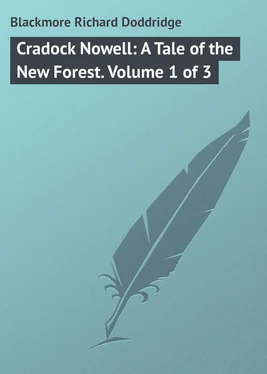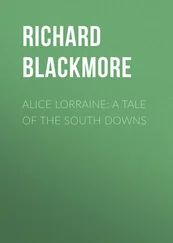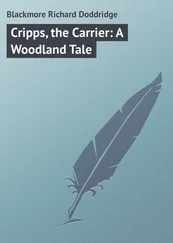Richard Blackmore - Cradock Nowell - A Tale of the New Forest. Volume 1 of 3
Здесь есть возможность читать онлайн «Richard Blackmore - Cradock Nowell - A Tale of the New Forest. Volume 1 of 3» — ознакомительный отрывок электронной книги совершенно бесплатно, а после прочтения отрывка купить полную версию. В некоторых случаях можно слушать аудио, скачать через торрент в формате fb2 и присутствует краткое содержание. Жанр: foreign_prose, на английском языке. Описание произведения, (предисловие) а так же отзывы посетителей доступны на портале библиотеки ЛибКат.
- Название:Cradock Nowell: A Tale of the New Forest. Volume 1 of 3
- Автор:
- Жанр:
- Год:неизвестен
- ISBN:нет данных
- Рейтинг книги:3 / 5. Голосов: 1
-
Избранное:Добавить в избранное
- Отзывы:
-
Ваша оценка:
- 60
- 1
- 2
- 3
- 4
- 5
Cradock Nowell: A Tale of the New Forest. Volume 1 of 3: краткое содержание, описание и аннотация
Предлагаем к чтению аннотацию, описание, краткое содержание или предисловие (зависит от того, что написал сам автор книги «Cradock Nowell: A Tale of the New Forest. Volume 1 of 3»). Если вы не нашли необходимую информацию о книге — напишите в комментариях, мы постараемся отыскать её.
Cradock Nowell: A Tale of the New Forest. Volume 1 of 3 — читать онлайн ознакомительный отрывок
Ниже представлен текст книги, разбитый по страницам. Система сохранения места последней прочитанной страницы, позволяет с удобством читать онлайн бесплатно книгу «Cradock Nowell: A Tale of the New Forest. Volume 1 of 3», без необходимости каждый раз заново искать на чём Вы остановились. Поставьте закладку, и сможете в любой момент перейти на страницу, на которой закончили чтение.
Интервал:
Закладка:
Poor little souls, they got their deserts with very scanty ceremony. When Biddy began to relate their crime, one glance at their fatherʼs face was enough; they hung behind, and dropped their eyes, and flushed all under their curling hair. Yet little did they guess the indignity impending. Hogstaff had followed all the way, and so had Mrs. Toaster, to plead for them. Sir Cradock sent them both away, and told Biddy to wait outside. Then he led his children to an inner room, and calmly explained his intentions. These were of such a nature that the young offenders gazed at each other in dumb amazement and horror, which very soon grew eloquent as the sentence was being executed. But the brave little fellows cried more, even then, at the indignity than the pain of it.
Then the stern father ordered them out of his sight for the day, and forbade every one to speak to them until the following morning; and away the twins went, hand in hand, down the cold cruel passage, their long flaxen hair all flowing together, and shaking to the sound of their contrite sobs and heart–pangs. At the corner, by the stewardʼs room, they turned with one accord, and looked back wistfully at their father. Sir Cradock had been saying to himself, as he rubbed his hands after the exercise – “A capital dayʼs work: what a deal of good it will do them; the self–willed little rascals”! but the look cast back upon him was so like their motherʼs when he had done anything to vex her, that away he rushed to his bedroom, and had to wash his face afterwards.
But, of course, he held to his stern resolve to see them no more that evening, otherwise the lesson would be utterly thrown away. Holding to it as he did, the effect surpassed all calculation. It was the turning–point in their lives.
“My boy, you know it hurts me a great deal more than you”, says the hypocritical usher, who rather enjoys the cane–swing. The boy knows it is hypocrisy, and is morally hurt more than physically. But wholly different is the result when the patient knows and feels the deep love of the agent, and cannot help believing that justice has flogged the judge. And hitherto their flesh had been intemerate and inviolable; the strictest orders had been issued that none should dare to slap them, and all were only too prone to coax and pet the beautiful angels. Little angels: treated so, they would soon have been little devils. As for the warning given last week, they thought it a bit of facetiousness: so now was the time, of all times, to strike temperately, but heavily.
That night they went to bed before dark, without having cared for tea or toast, and Biddyʼs soft heart ached by the pillow, as they lay in each otherʼs arms, hugged one another, having now none else in the world to love, and sobbed their little troubles off into moaning slumber.
On the following morning, without any concert or debate, and scarcely asking why, the little things went hand in hand, united more than ever by the recent visitation, as far as the door of their fatherʼs bedroom. There they slank behind a curtain; and when he came out, the rings above fluttered with fear and love and hope. Much as the fatherʼs heart was craving, he made believe to walk onward, till Craddy ran out, neck or nothing, and sprang into his arms.
After this great event, their lives flowed on very happily into boyhood, youth, and manhood. They heartily loved and respected their father; they could never be enough with John Rosedew; and although they quarrelled and fought sometimes, they languished and drooped immediately when parted from one another. As for Biddy OʼGaghan, now a high woman in the household, her only difficulty was that she never could tell of her two boys which to quote as the more astounding.
“If you plase, maʼam”, she always concluded, “thereʼll not be so much as the lean of a priest for anybody iver to choose atwane the bootiful two on them. No more than there was on the day when my blissed self – murder now! – any more, I manes, nor the differ a peg can find ’twane a murphy and a purratie. And a Murphy I must be, to tark, so free as I does, of the things as is above me. Says Patrick OʼGeoghegan to meself one day – glory be to his sowl, and a gintleman every bit of him, lave out where he had the small–pux – ʼBiddy’, he says, ’hould your pratie–trap, or Iʼll shove these here bellises down it’. And for my good it would have been, as I am thankful to acknowledge that same, though I didnʼt see it that day, thank the Lord. Ah musha, musha, a true gintleman he were, and lave me out his fellow, maʼam, if iver you comes acrass him”.
But, in spite of Biddyʼs assertion, there were many points of difference, outward and inward too, between Cradock and Clayton Nowell. By this time the “Violet” was obsolete, except with Sir Cradock, who rather liked it, and with young Crad, who had corrupted it into the endearing “Viley”. John Rosedew had done his utmost to extinguish the misnomer, being sensitive on the subject, from his horror of false concord, as attributed to himself. Although the twins were so much alike in stature, form, and feature that it required care to discern them after the sun was down, no clear–sighted person would miscall them when they both were present, and the light was good. Clayton Nowellʼs eyes were brown, Cradockʼs a dark grey; Cradockʼs hair was one shade darker, and grew more away from his forehead, and the expression of his gaze came from a longer distance. Clayton always seemed up for bantering; Cradock anxious to inquire, and to joke about it afterwards, if occasion offered. Then Cradockʼs head inclined, as he walked, a little towards the left shoulder; Claytonʼs hung, almost imperceptibly, somewhat to the right; and Cradockʼs hands were hard and dry, Claytonʼs soft as good French kid.
And, as regards the inward man, they differed far more widely. Every year their modes of thought, fancies, tastes, and habits, were diverging more decidedly. Clayton sought command and power, and to be admired; Cradockʼs chief ambition was to be loved by every one. And so with intellectual matters; Clayton showed more dash and brilliance, Cradock more true sympathy, and thence more grasp and insight. Clayton loved the thoughts which strike us, Cradock those which move us subtly. But, as they lived not long together, it is waste of time to finesse between them. Whatever they were, they loved one another, and could not bear to be parted.
Meanwhile, their “Uncle John” as they always called Mr. Rosedew – their uncle only in the spirit – was nursing and making much of a little daughter of his own. Long before Lady Nowellʼs death, indeed for ten long years before he obtained the living of Nowelhurst, with the little adjunct of Rushford, he had been engaged to a lady–love much younger than himself, whose name was Amy Venn. Not positively engaged, I mean, for he was too shy to pop the question to any one but himself, for more than seven years of the ten. But all that time Amy Venn was loving him, and he was loving her, and each would have felt it a grievous blow, if the other had started sideways. Miss Venn was poor, and had none except her widowed mother to look to, and hence the parson was trebly shy of pressing a poor manʼs suit. He, a very truthful mortal, had pure faith in his Amy, and she had the like in him. So for several years he shunned the common–room, and laid by all he could from his fellowship, college–appointments, and professorship. But when his old friend Sir Cradock Nowell presented him to the benefice – not a very gorgeous one, but enough for a quiet parsonʼs family – he took a clean white tie at once, vainly strove to knot it grandly, actually got his scout to brush him, and after three glasses of common–room port, strode away to his Amy at Kidlington. There he found her training the apricot on the south wall of her motherʼs cottage, one of the three great apricot–trees that paid the rent so nicely. What a pity they were not peaches; they would have yielded so fit a simile. But peachbloom will not thrive at Kidlington, except upon ladies’ faces.
Читать дальшеИнтервал:
Закладка:
Похожие книги на «Cradock Nowell: A Tale of the New Forest. Volume 1 of 3»
Представляем Вашему вниманию похожие книги на «Cradock Nowell: A Tale of the New Forest. Volume 1 of 3» списком для выбора. Мы отобрали схожую по названию и смыслу литературу в надежде предоставить читателям больше вариантов отыскать новые, интересные, ещё непрочитанные произведения.
Обсуждение, отзывы о книге «Cradock Nowell: A Tale of the New Forest. Volume 1 of 3» и просто собственные мнения читателей. Оставьте ваши комментарии, напишите, что Вы думаете о произведении, его смысле или главных героях. Укажите что конкретно понравилось, а что нет, и почему Вы так считаете.












